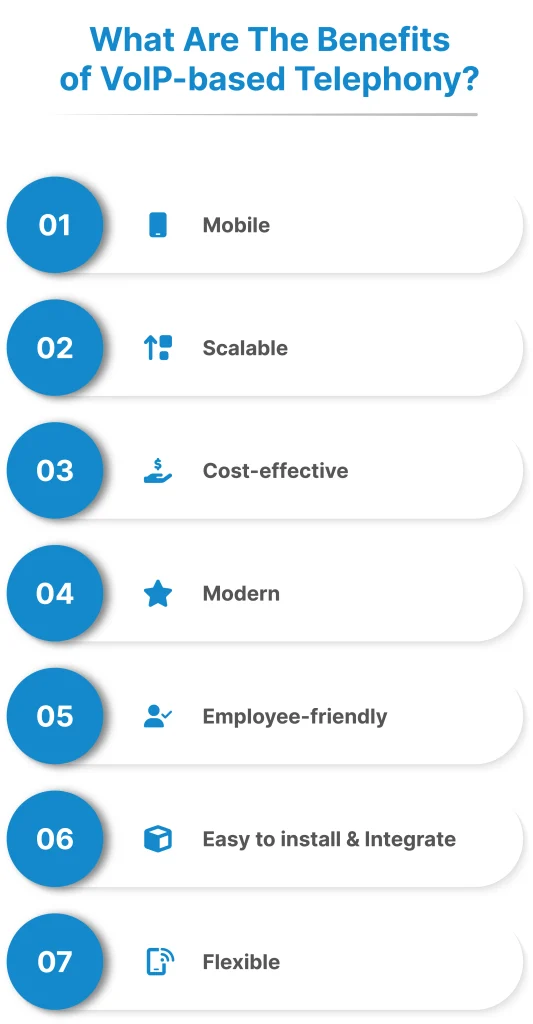While landlines were a communications revolution on their own, the year 1995 brought us a glimpse of the future by freeing users from phone cords and singular locations with the introduction of VoIP phones.
But what is it that makes them so desirable over traditional options, especially for burgeoning and veteran businesses alike?
That is what we are here to uncover today, so let us begin.
What Are VoIP Phones?
Any phone that utilizes IP technology in order to send and receive calls instead of using traditional means is considered a VoIP phone.
A VoIP phone is not just one singular thing either. Sure, they most often come with physical hardware that supports VoIP phone functionality, but nowadays, even our smartphones can be utilized as VoIP phones if your provider supports it, or through a number of different apps.
How They Work
Rather than sending out compressed radio waves to cell towers over mobile phones or having to use landlines in order to connect to others, VoIP phones convert generated sound into data packets which are then sent to the VoIP service provider where a number of things happen depending on what type of line is being dialed:
• The provider receives the data and sets the call up over PSTN
• If the receiving end is a VoIP phone, the data packets are transferred over without further interaction where they are converted back to the sender’s message
• If the receiving end is not a VoIP phone, then the data packets are converted to analog audio so that it is compatible with traditional phone methods.
The Benefits Of VoIP-based Telephony

Mobility
Simply put, a VoIP phone is more mobile than a landline would be with no expensive hardware installation fees that could take precious time away, and it is not limited by cell tower coverage, but rather by internet coverage which tends to be the more stable (and more affordable) option in modern times.
This allows them to not suffer the limitations of traditional landlines and lets users utilize their VoIP phone number from any location with a stable internet connection.
Enabling Modern Work Options
VoIP phone technology is also one of the more mandatory steps for most businesses if they plan on implementing modern work options like remote or hybrid work by providing their employees the same functionalities at home as they would have in their offices.
Larger Potential Employee Pool
Sequentially, it also allows businesses to hire from much further away than their physical locations as employees would no longer need to commute long hours just to have access to a viable place of work, opening up a richer pool of potential, high quality employees.
Lower Overhead Costs
When establishing a business, setting communication lines up is a crucial step. However, traditional landlines can take a while to set up which was an issue that was finally resolved as technology advanced.
With VoIP phones, there is no needless labor-intensive installation process with tons of expensive hardware, just phones and an internet connection that they can hook up to on top of a valid PSTN network, drastically reducing costs of setup, especially for businesses with operational contact centers.
Maintenance can also be offloaded to the VoIP service provider in case the business does not want to have an in-house system, further lowering these costs.
Easier Scalability
Another issue that stems from the same source is scalability. Once a traditional PBX system was set up and a business outgrew it, putting new phones in often meant having to do additional work to manage it which took precious resources away from more productive tasks.
With VoIP telephony, it is as easy as getting phones in for new offices and registering new numbers in a matter of minutes.
This not only allows existing businesses to grow, but also allows emerging ones to establish their footing at a much faster, and more affordable pace without losing out on quality of service.
Access To Modern Technologies
The tech behind modern landlines is becoming too archaic which imposes massive limitations on how far one can innovate around them.
VoIP phone systems, however, do not possess such a constrictive limitation and allow for greater flexibility in phone services.
Great examples of this include easy establishment of conference calls, a feature which most VoIP phone systems have access to, or the ability to link different phone numbers to VoIP phone systems in order to help forward calls should the primary line be down for whatever reason, allowing for greater reliability.
Modernizing Traditional PBX Systems
We have mentioned that switching to a VoIP phone system is beneficial for both new and existing businesses alike, but the fact of the matter is that a lot of already established businesses have that traditional PBX system at their core with a lot of investment put behind it.
They are going to be a lot less inclined to make the switch if it does not offer significant benefit to them, but luckily they do not have to.
As a service provider, make sure your clients know that modern VoIP phone systems utilize SIP trunking to bridge the gap between traditional PBX and VoIP telephony, leaving their initial investment intact and making it more lucrative and efficient than it already was.
The Future Of Communication
There is no doubt that VoIP telephony is the future of business communication and communication as a whole.
Thanks to its availability, it has ingrained itself into almost every aspect of our culture from schools and hospitals to offices and gaming spaces.
Some of the more popular names like Skype, Whatsapp and Zoom all utilize VoIP in order to establish voice communication so it is safe to say that VoIP is here to stay for the time being and that investing in upgrading a traditional PBX system to possess VoIP capabilities is a given.
Our own UC apps enable this thanks to our seamless integration policy, allowing existing systems to integrate VoIP capabilities painlessly and within minutes.
What we offer is a next-gen communication tool aimed at enabling hybrid work practices where users can utilize the same extensions across multiple phones in different locations, allowing them to take their work wherever they want to with eligible service.
It is no coincidence that Bicom Systems’ vision states the very same idea “To liberate the world from traditional communication systems” because the VoIP future is so much more robust.
That is why we continuously strive to innovate with our services in order to help businesses take a step in the right direction.
If you wish to know more about the services that we offer, feel free to give us a call, or request a demo of one of our products.

